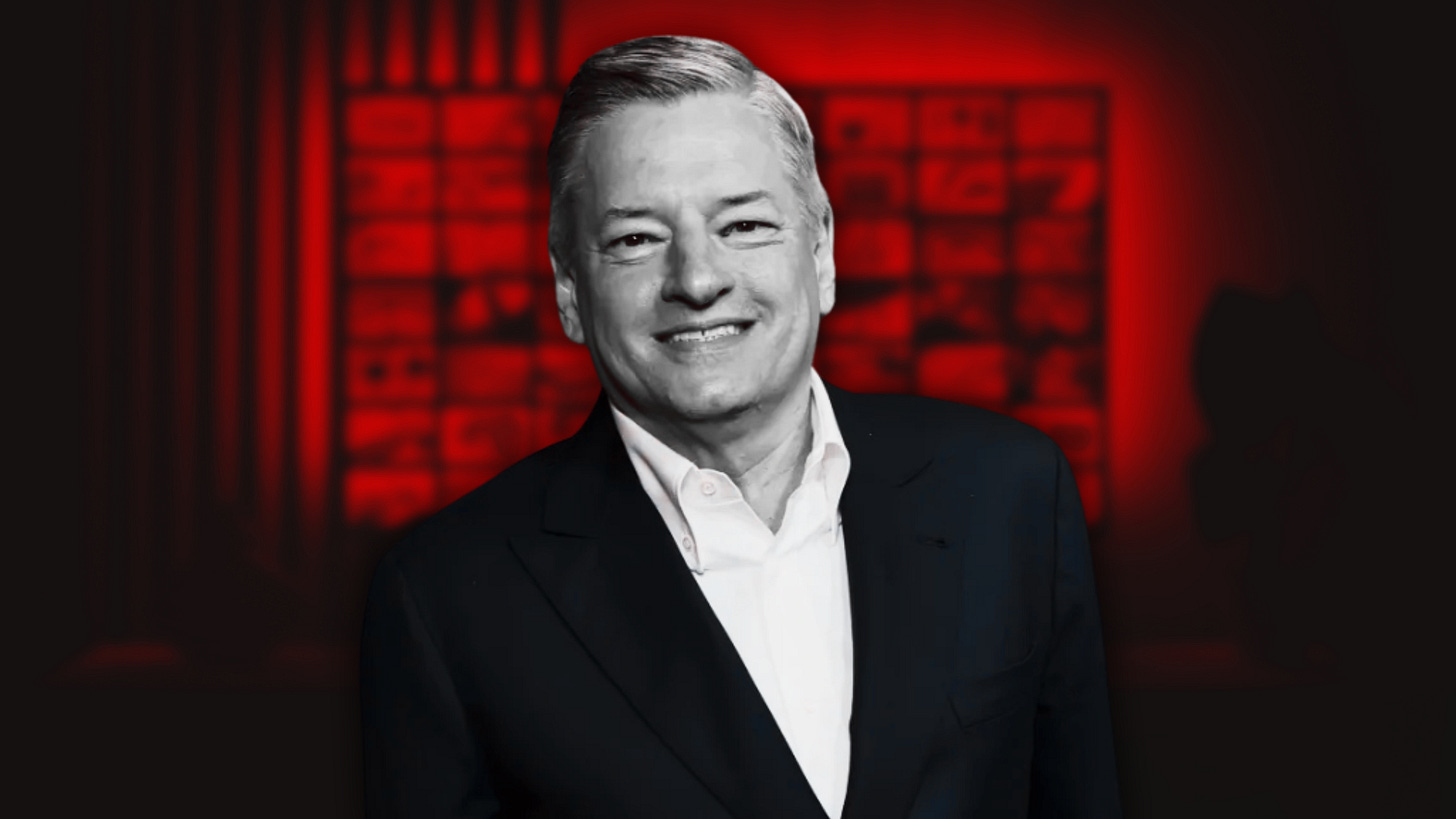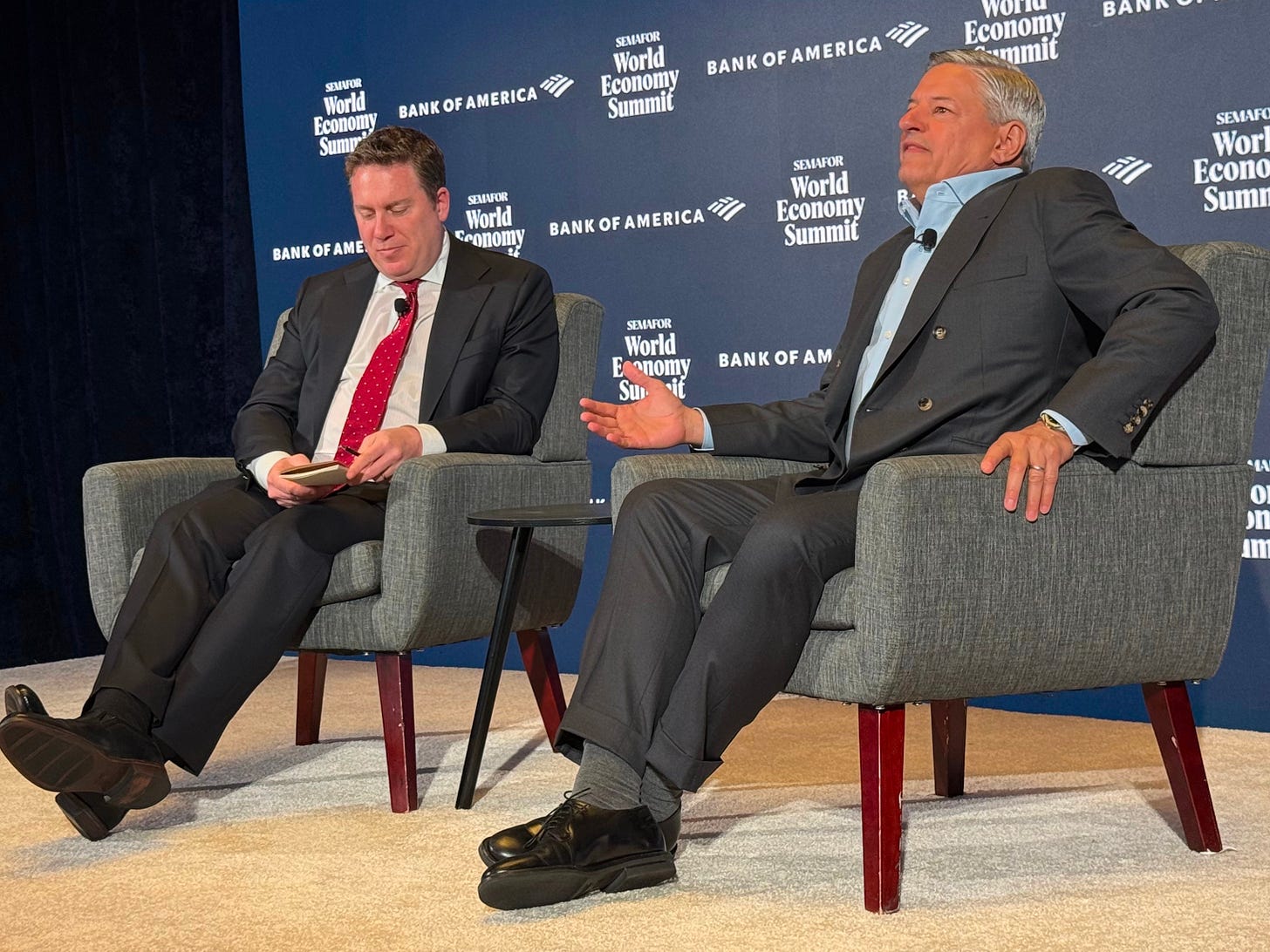The Netflix Effect
New rules from global entertainment empire CEO, Ted Sarandos
Netflix isn’t just changing what we watch — it’s transforming how stories are made, shared, and experienced around the world. By empowering local creators, expanding into immersive fan experiences, and embracing cultural specificity over global sameness, the company is rewriting the rules of entertainment for a new era.
WASHINGTON, D.C. — In this city where policy is still too often shaped by yesterday’s industries, Netflix’s Co-CEO Ted Sarandos took the stage yesterday at the Semafor World Economy Summit to remind the capital that streaming is no longer just a sideshow. It’s one of the main events.
“If we were building a plant to make a billion dollars worth of cars, you can be sure the president would show up,” Sarandos said. And while that acknowledgment hasn’t yet happened here in the U.S., it did earlier this year in Mexico, where Sarandos shared the stage with President Gloria Sheinbaum to announce plans to spend $1 billion on film and TV production there over the next four years.
No matter how you cut it, Netflix’s contribution to the U.S. economy alone is staggering — $125 billion since 2020, 140,000 production jobs created, and 500 productions across all 50 states. However, Netflix’s broader strategy is to rewrite the rules of global storytelling, one country at a time, decentralizing Hollywood’s oversized role in entertainment and creating something new and more authentic, more local.
Rule #1: Local is Global
Netflix’s massive global footprint isn’t just about where it streams — it’s about where it creates. The company’s cultural and economic model has upended traditional assumptions that entertainment needs to be built for the biggest market to succeed.
The trick, according to Sarandos? Don’t try to go global. “There’s no discussion about making anything from a local country global,” he said. “The more authentically local it is, the more likely it is to travel.”
That’s how Squid Game — a hyper-Korean, dystopian thriller — became the most-watched show in Netflix’s history. “It was not romantic, it was very straight, but very Korean,” Sarandos noted. “If you’re into Bong Joon Ho’s early horror, it was like Parasite but fun. The more rooted it was, the more it worked.”
The success of Squid Game wasn’t engineered, but it was a windfall. Netflix didn’t greenlight it with the intent of creating a global smash. It greenlit it because it was a compelling Korean story. And viewers everywhere responded.
Rule #2: Give Creators Real Autonomy
At the heart of this new entertainment economy is trust, not in algorithms, but in local creative teams.
“What’s unique about what we’re doing is that teams in each country have absolute autonomy,” Sarandos said. “They program for the country, not for the world. But if it works at home, it might just work everywhere else too.”
That principle birthed Adolescence, a chilling British series about a 13-year-old boy radicalized online, released in March this year. It quickly became Netflix’s most-watched English-language original in the UK, overtaking even BBC programming — a first in the country’s broadcast history. It also soared to the top of the charts in other countries around the world.
“It’s so British that most of you will probably watch it with subtitles — even though it’s in English,” Sarandos quipped. But the story — raw, timely, and expertly told — resonated across borders.
The show sparked outrage, empathy, and political debate, including a viral moment when UK Conservative party-leader Kemi Badenoch was shamed on air for not having watched it. “I’ve never seen anyone get shamed for not watching a TV show so much,” Sarandos said, half-laughing. “But everyone in the country was talking about it. And globally, it’s been enormous.”
Rule #3: Redefine Cultural Exports
For decades, cultural exports meant one thing: American movies and TV shows, translated or subtitled, for the rest of the world. Netflix flipped that model — not by rejecting American stories, but by widening the aperture of what’s considered export-worthy.
From Korean horror to German thrillers, Spanish heist dramas to Nigerian rom-coms, Netflix has turned cultural specificity into a global asset.
The takeaway? Entertainment doesn’t need to be sanitized or simplified to cross borders. “The thing that travels best,” Sarandos said, “is not the softest version of a story. It’s the hardest.”
Rule #4: Expand IP Into Experiences
Sarandos doesn’t shy away from talking numbers. Netflix’s subscriber base tops 260 million. Its revenues are booming. And yes, he has talked about turning Netflix into a trillion-dollar company — a long-term ambition, he admits, not a prediction.
But to reach that goal, Netflix is doing more than streaming. It’s building experiences — not theme parks like Disney and Universal, but something more fluid, more personal.
Think Broadway productions (Stranger Things: The First Shadow), immersive fan experiences (Bridgerton balls, Squid Game experiences), and even physical spaces (Netflix House). These are all part of a broader experiment: what happens when storytelling comes to life off the screen?
“The fandom is real,” Sarandos said. “We’ve had seven marriage proposals at Bridgerton Balls. We’re not just making shows — we’re creating relationships between fans and stories.”
Consumer products, Sarandos concedes, may have low margins. But they also have a high impact. “We sell Surfer Boy pizza (from Stranger Things) at Walmart. It’s now the number one frozen pizza brand there,” he said. “Is it marketing? Sure. But it’s also connection. That’s what matters.”
Rule #5: Personalization Is the Brand
If Disney is family-friendly and HBO is prestige, what’s Netflix?
According to Sarandos, “Our brand is personalization.” That means no one-size-fits-all storytelling. No neat genre labels. Just a platform where a Mexican viewer can fall in love with a Turkish drama, and a British crime thriller can top charts in Brazil.
In this world, Squid Game and Bridgerton don’t compete. Rather, they coexist. The magic lies in the algorithm’s ability to connect people to what they didn’t know they needed.
That’s why the idea of Netflix House isn’t so far-fetched. “It’s a house with many rooms,” Sarandos said. “You come in through your own entrance. That’s the point.”
The Netflix Blueprint
What Sarandos outlined wasn’t just a defense of Netflix’s role in the U.S. and global economy — it was a blueprint for the next phase of entertainment.
It’s a model rooted in radical creative autonomy, global-local synergy, experiential storytelling, and audience-driven personalization. One where the boundaries between local and global, passive viewing and active participation, are not just blurred — they’re erased.
Netflix didn’t just change what we watch. It changed how we watch. And in doing so, it’s forced an entire industry — and increasingly, the world’s policymakers — to pay attention.
In Sarandos’ words: “People forget this is a real business.” That’s no longer just a reminder. It’s a challenge.






